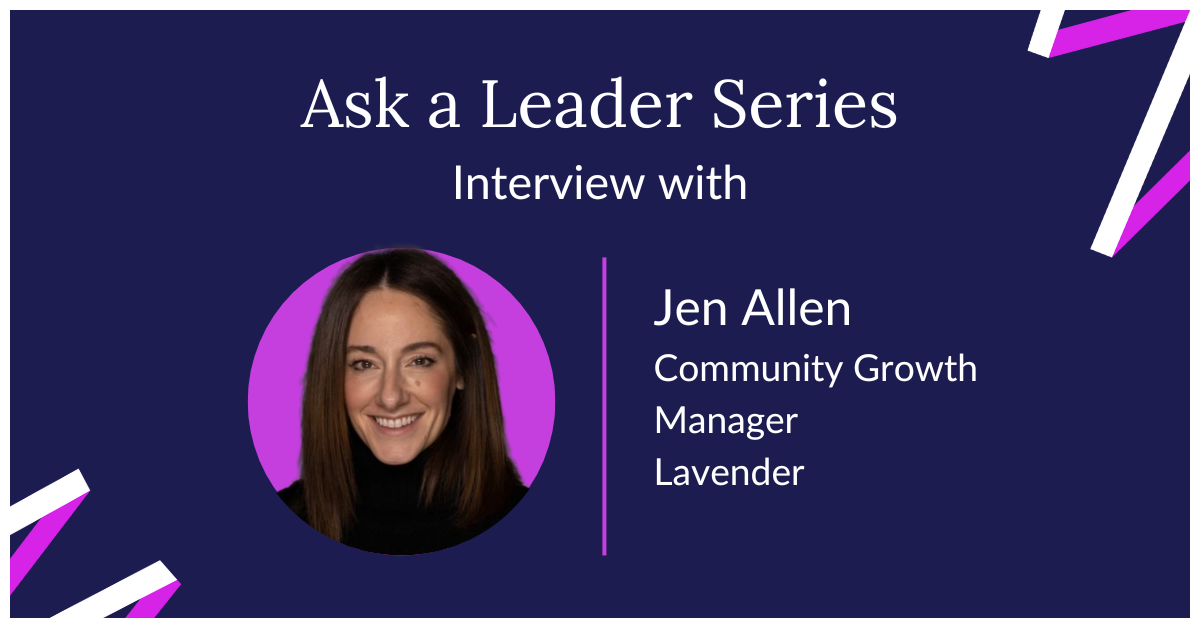Interview with Jen Allen, Community Growth Manager at Lavender
In this interview, Community Growth Manager Jen Allen from Lavender talks about why she got into sales, her biggest pet peeve during a sales interaction, advice for reps faced with a big buying team, her #1 tip for objection handling, sales engagement tips for SDRs, and advice she'd give herself if she could go back in time.
1. What made you want to get into sales?
I didn't want to get into sales. I was working at a job at Penn State that I stuck with for the year after I graduated and stayed. Penn State is actually in State College, Pennsylvania, and there is absolutely nothing going on there if you're not in school.
And so I had a roommate who started working at this company I'd never heard of called Corporate Executive Board, or CEB. She called me up one day and said, 'You've got to come work for this company. Super bright people, lots of fun.'
And I was like, that's it, I'm sold.
So I moved and I took the job because I just really wanted to get out of central Pennsylvania. But what kept me in sales from the get was I was lucky enough to have an amazing manager and she had a force of presence unlike any other.
And at the time we were selling subscriptions to best practice research to C-level executives. Our group was selling to the CMOs. And I just remember sitting there the first couple of weeks of being employed and hearing her talk to the CMO of Walmart and the CMO of Pepsi, and she was totally unafraid to push their thinking and engage with them in these really smart conversations that I was just enamored with her and I said, I want to be that one day.
And so that that's really what kept me in sales–her.
2. What's your biggest pet peeve during a sales interaction?
For me, it is the misunderstanding of what discovery is and leading a conversation where we are just totally self-centric and thinking about, 'Do you have budget? Do you have authority? Do you have needs? Do you have a timeline?'
A BANT-style discovery to me is just the bane of all salesmanship.
So what I cannot stand is when a seller is completely self-motivated in the time that they're spending with the customer to decide 'what can I get out from this?' instead of looking at the buyer and saying, 'What's the problem you're trying to solve? Let's think together about how we fix it.'
3. What's your advice for reps faced with a big buying team?
I love this question.
I have made every mistake in the book when it comes to selling to buying teams, so my number one piece of advice would be to seek disagreement, don't seek agreement.
And what I mean by that is, we work so hard in these large buying groups to get to the point at which we have the opportunity to present to them, right? And you get that meeting and you're so excited and you prep everything and you look at everybody's roles and responsibilities.
And then we, as salespeople, naturally show up and we're trying to convince everybody
to buy the solution. I think what that does is it alienates you from the group, because all of a sudden, you're someone on the outside trying to push a decision onto a group of people that often totally disagree about the problem they're solving, what they should do to solve it, who they should solve it with.
Instead, what I would recommend is to view your role as almost like a third-party facilitator.
Go into the meeting, hold up a mirror and say, 'In the conversations I've had with some of you, here is how I've interpreted the problem statement. Now, let's agree and disagree on that.'
Right from the get, like is this even the right problem we should be solving? And almost tell me why that is. And I think what we find a lot of times is when we start with the problem, we open up the forum for disagreement.
I’ve done this on so many deals where I've got a portion of the buying group who's saying we have a new logo acquisition problem. And then I've got another portion of the group saying,
'No, no, no, it's customer retention.'
And when you come in and you help the group norm around these differences, they view you as additive value to that conversation as opposed to if I come in and I'm like, 'Buy this thing that I have to sell you,' where they view you as a distraction.
And so I think that our biggest opportunity is to be comfortable seeking disagreement, not going in and just trying to convince everybody to buy. And what I find is when I do that, they invite you back and back and back and back because you're part of the solution, not just part of making a sale.
4. What's your #1 objection handling tip?
I would say, stop trying to handle it.
Every objection is a piece of information. It gives us a signal as to something that is missing from that buyer. So if the buyer says, 'I don't have enough time or it's too expensive,' that immediately triggers in my mind that there's something I probably failed to do in how I positioned this.
And if I'm focused on trying to handle it, it creates this offense-defense dynamic between me and the buyer. And guess who's going to win that 100% of the time? It's the buyer, right? Because they hold the cards.
So what I want to do instead of handling it, which feels like me telling someone, 'No, your feelings are invalid, and what you're saying is wrong because of X, Y, and Z,' I use that as an opportunity to go back to discovery and say, 'Okay, help me understand, when you say it's too expensive, what are you comparing this to? Or when you say it's too expensive, is there something else that has increased in priorities since we first spoke?'
And I think when we look to just learn instead of trying to fix– it's like when we get advice
from our spouse or our friends, it's like, sometimes I don't want you to just fix it, I just need you to listen–that, I think, is something we as sellers fail to do oftentimes.
Just show up like a human being.
So that would be my number one piece of advice. Don't try to handle it. Try to listen to it,
Try to learn something. There's a piece of information in there that will help you.
5. What's a good sales engagement tip for SDRs?
I am very much in the camp of relevance. So what I will do, and what I advise people to do all the time, is type the company's name you're chasing, then a + sign, then the CEO's name, then another + sign, and add either "podcast" or the word "interview."
Google that.
And what you'll find in most cases, I don't care if it's public, private, big or small, CEOs are out there publicly talking about their businesses. And we can learn so much about current state if we just take the time to do that.
So what I'll do is I'll rarely watch the whole thing, but I'll look at the transcript, or I'll go to the middle and then I'll pull out.
What is that company trying to do? How does that CEO think they need to do it? And then what problem can I ascertain?
They may be misunderstanding in their pursuit of trying to get from A to B, and then I'll pull that into my email. So when I send an email, my email subject line will actually be the CEO's name and comments. Because if someone emailed the CEO's name and comments to me, I'd be like, 'Are they talking bad about me? What did I do?'
It just sparks the open.
But then once they open it, I'm getting right to. "CEO spoke about how Acme Company is trying to do X and it looks like from what I can tell, you're trying to do that by Y. I'm curious, have you ever explored how this thing over here affects your ability to do Y? Are you open to a conversation?"
And I'm not saying it's the perfect email. I'm not saying it's a silver bullet. But what I can feel really good about is that the buyer knows I've taken the time to express an interest and curiosity in their business.
And sometimes I think it's really just that easy. Just show you give a you-know-what about this business
And at least I think that the buyer will respond and just say 'thank you for taking the time to actually learn about what we do,' because most sellers don't do that.
6. If you could go back in time, what advice would you give yourself?
I would say, 'Stop being so serious. Your idea of what professionalism is is from the 1950s.'
And that's why I'm really excited about, particularly about this world that we're in now, where you have creators.
So I know you had Will Aitken on the show. I think Will is just iconic, and his ability to actually be really smart and credible and teach but have fun doing it.
And if I look back to when I started selling 18 years ago, I had this imagery in my mind of the professional seller in a suit and they use these big buzzwords and they take no prisoners and they always be closing, right?
And I was trying to be that. But that is so against who I am as a person.
And I remember there was a woman I was meeting with who was a customer, and I was running my script of what I thought I was supposed to say about this problem that she shared. And she stopped me and she said, 'Jen, what do you personally think about this problem?'
And it threw me off. And she knew; it's why she asked the question.
And I told her, 'I believe in what I said.' And she said, 'It doesn't come across that way. It comes across as really inauthentic. I would encourage you to bring your own point of view and your perspective. I'm interested because you talk to other people that have my job.'
That was one of those pivotal moments where I look back and I'm so grateful she made me uncomfortable because then I really leaned into who I was.
So I think in a world where we are just chasing not being commoditized, the very one thing you can't commoditize, is you and your story and how you tell it.
And so I would always encourage sellers that if you felt the same way I did, knock that down and you will start to see tremendous results when you just truly bring you into the equation,
as cheesy as that sounds.
Check out our interview with Founder and CEO Jason Bay for expert sales advice for aspiring leaders.











